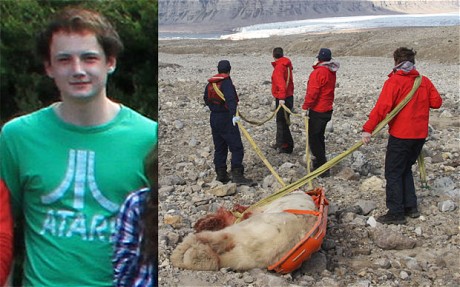 Above, Horatio Chapple and the body of the polar bear that killed him.
Above, Horatio Chapple and the body of the polar bear that killed him.
The British Gazette (and we are sure, all its readers) send their heartfelt condolences to the grieving parents of Horatio Chapple, the Etonian who was hoping to become a doctor.
One of the cruellest aspects for Mr and Mrs Chapple will over the course of the years that follow will be: “What would have been?” “How would Horatio have fared with his studies?” “What area of medicine would he have ended up been employed in?” “What girl might he have married and what would our grandchildren have been like?” For all these questions there is but one answer: Such will never now be. It is one of the most painful of all situations.
The British Gazette is NOT going to use this young man’s death for the purposes of pontification. Mr and Mrs Chapple deserve better than that. However, this organ will point out certain facts:
In response to claims aired by amongst others, the BBC, that as the arctic sea ice recedes (due supposedly to non existent global warming) the polar bears have nowhere to go: This is simply not the case.
Firstly, although the arctic sea ice normally recedes at this time of year (Summer in the Northern Hemisphere) there has been an unexpected increase in sea ice.
Secondly, when the sea ice does recede, the polar bears do indeed have somewhere to live. One of the principal areas where polar bears are to be found is the Savalbard archipelago – where Horatio was. The archipelago is located between latitudes 74° and 81° North (and thus inside the Arctic Circle), and between longitudes 10° to 35° East. Spitsbergen is the largest island, followed by Nordaustlandet and Edgeøya. The total land area of the archipelago is 23,561 square miles – nearly three times the size of Wales.
Speaking the Truth unto the Nation

I support the Editor’s comments regarding this tragic and avoidable incident. There is another point to be made. There seems to be a cosy belief that when we leave these islands to go abroad for whatever purpose, we are going into an environment as benign and unthreatening as that commonly found here. It is as though people expect that ‘abroad’ is no more than an example and a speciman of all the conditions commonly experienced in this country. As the example under discussion shows, nothing could be further from reality.
There appears to be on the part of the public, a staggering lack of understanding of the potential danger to life and limb when ‘abroad’. The threats posed by disease. criminality, corruption and climate are a regular weekly feature in our media and you can be certain that only the most newsworthy ever makes it to the pages of print or onto television, None of this is to infer that people should not venture outside these shores. Go – but be on your guard.